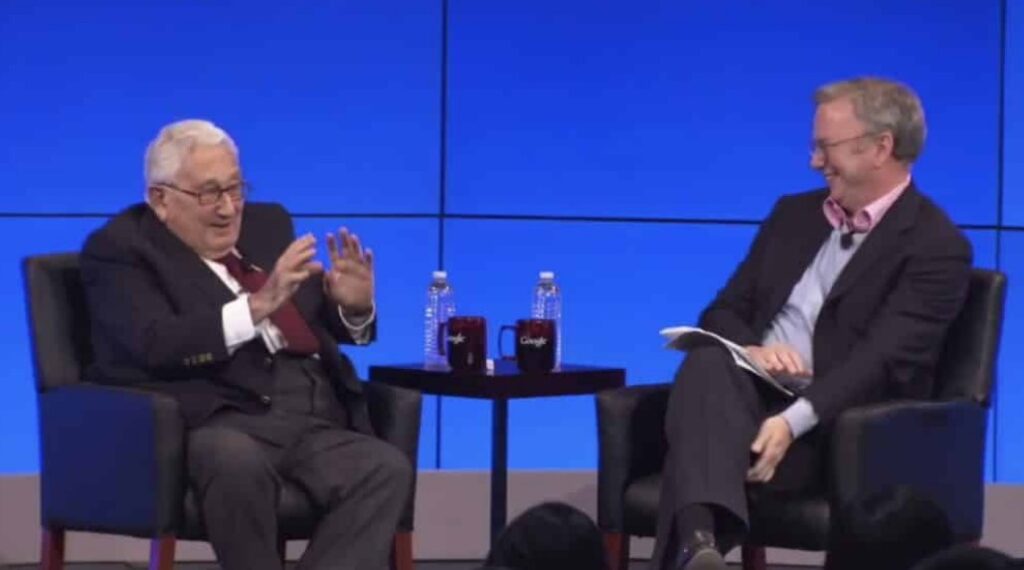 Former Google and Alphabet boss Schmidt is working with the military to change the face of modern warfare with advanced AI weaponry, which he likens to the significance of the atomic bomb in WWII. He has also emerged as the heir apparent to Henry Kissinger, a founding member of the Trilateral Commission in 1973. — Technocracy News & Trends Editor Patrick Wood
Former Google and Alphabet boss Schmidt is working with the military to change the face of modern warfare with advanced AI weaponry, which he likens to the significance of the atomic bomb in WWII. He has also emerged as the heir apparent to Henry Kissinger, a founding member of the Trilateral Commission in 1973. — Technocracy News & Trends Editor Patrick Wood
Expensive military hardware like a new tank undergoes rigorous testing before heading to the battlefield. A startup called Istari, backed by Eric Schmidt, the former CEO of Google and chair of Alphabet, reckons some of that work can be done more effectively in the metaverse.
Ishtari uses machine learning to virtually assemble and test war machines from computer models of individual components, such as the chassis and engines, that are usually marooned on separate digital drawing boards. It may sound dull, but Schmidt says it can bring a dose of tech industry innovation to US military engineering. “The Istari team is bringing internet-type usability to models and simulations,” he says. “This unlocks the possibility of software-like agility for future physical systems—it is very exciting.”
The company reflects Schmidt’s unique position as a link between the tech industry and the Pentagon. Virtual replicas known as digital twins are common in manufacturing and could help the Pentagon develop hardware more quickly. And Istari is a building block in a wider project in which Schmidt is attempting to bring Silicon Valley technology and thinking to the US military.
That quest has roots in the shock Schmidt experienced in 2016 when he first glimpsed the state of Pentagon technology up close. He was still chair of Alphabet but accepted an invitation from President Obama’s defense secretary Ashton Carter to chair a new Defense Innovation Board trying to modernize the DOD. Schmidt’s new post began with an eye-opening tour of US labs and bases.
“I got to run around with Eric and look at how the department was engaging on commercial technology,” says Will Roper, who was then an assistant secretary of the Air Force focused on technology and is the founder and CEO of Istari. “It was evident that the entire Department of Defense was developing software the same way it was done in the 1970s and ’80s,” Roper says. He was one of many Pentagon leaders who were impressed by Schmidt‘s diagnosis of the department’s problems and willingness to try to solve them.
Schmidt became CEO of Google in 2001, when the search engine had a few hundred employees and was barely making money. He stepped away from Alphabet in 2017 after building a sprawling, highly profitable company with a stacked portfolio of projects, including cutting-edge artificial intelligence, self-driving cars, and quantum computers.
 Wired for War: The Robotics Revolution and Conflict in the 21st Century
Wired for War: The Robotics Revolution and Conflict in the 21st Century
Schmidt now sees another opportunity for technological reinvention to lead to domination, this time for the US government in competition with other world powers. He may be uniquely well positioned to understand what the Pentagon needs to reach its technological goals and to help the agency obtain it. But his ties to industry raise questions about how the US should aim to align the government and the private sector. And while US military power has long depended on advances in technology, some fear that military AI can create new risks.
Speaking over Zoom from his office in New York, Schmidt lays out a grand vision for a more advanced DOD that can nimbly harness technology from companies like Istari. In a cheery orange sweater that looks like it’s made of exquisite wool, he casually imagines a wholesale reboot of the US armed forces.
“Let’s imagine we’re going to build a better war-fighting system,” Schmidt says, outlining what would amount to an enormous overhaul of the most powerful military operation on earth. “We would just create a tech company.” He goes on to sketch out a vision of the internet of things with a deadly twist. “It would build a large number of inexpensive devices that were highly mobile, that were attritable, and those devices—or drones—would have sensors or weapons, and they would be networked together.”
The problem with today’s Pentagon is hardly money, talent, or determination, in Schmidt’s opinion. He describes the US military as “great human beings inside a bad system”—one that evolved to serve a previous era dominated by large, slow, expensive projects like aircraft carriers and a bureaucratic system that prevents people from moving too quickly. Independent studies and congressional hearings have found that it can take years for the DOD to select and buy software, which may be outdated by the time it is installed. Schmidt says this is a huge problem for the US, because computerization, software, and networking are poised to revolutionize warfare.
Sourced from Technocracy News & Trends
Become a Patron!
Or support us at SubscribeStar
Donate cryptocurrency HERE
Subscribe to Activist Post for truth, peace, and freedom news. Follow us on SoMee, Telegram, HIVE, Flote, Minds, MeWe, Twitter, Gab, What Really Happened and GETTR.
Provide, Protect and Profit from what’s coming! Get a free issue of Counter Markets today.

Be the first to comment on "Trilateral Commissioner Eric Schmidt Is Building The Perfect Warfare AI"